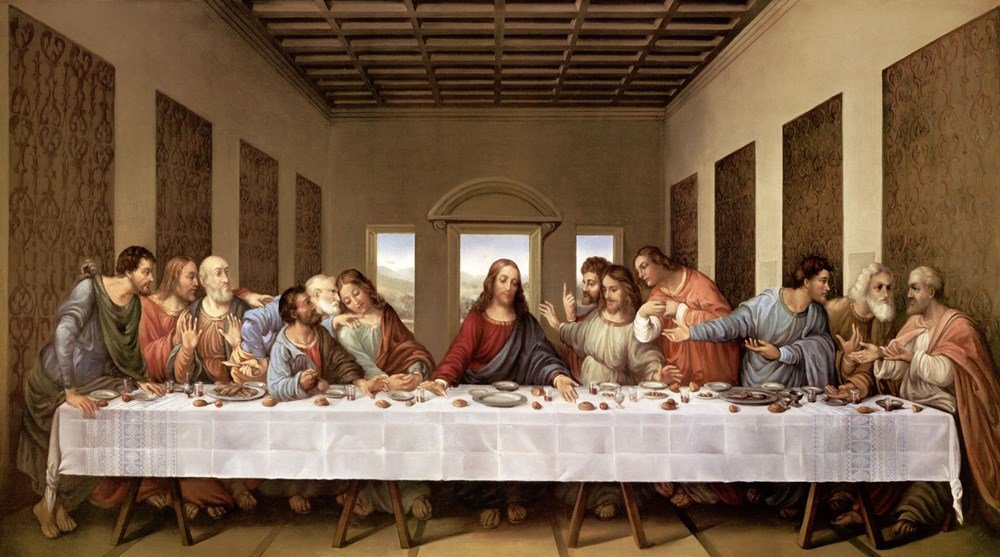By Pastor Harold Bolinger
What does Easter have to do with Anti-Semitism? Why do Christians celebrate a pagan festival of rabbits and sunrise services more consistent with Paganism than Christ’s death during the Passover season? What is “right” for Christians today? As Christ himself was Jewish, how could a Christian not respect the Jewish nation or heritage? Interesting questions all, and ones that certainly deserve answers–especially in this Passover season.
Perhaps I see things through different eyes than most. For example, I cannot hold it against all of the residents of the neighborhood when one particular tenant has wild parties every night. As I see it, only the offending home is guilty. The rest of that street’s people are pleasantly innocent, as much victims of the troublemakers as others nearby.
So why then would followers of a Jew be hard-hearted and hard-headed against all other Jews; against every tenet of their God-given religion; against their tireless effort to preserve the Word of God through the ages; and all their other good deeds on behalf of the Creator of us all?
With rare exception, the original Apostles were Jews. Christ himself kept the Passover and all other Jewish feasts, fasts and Sabbaths.
Something just didn’t seem right about that. So as a believer I asked God to give me wisdom as to the beginning of “anti-Semitism” – so that perhaps I could help END it forever. God answered my question on this subject rather bluntly.
In my search, a rather interesting link between Anti-Semitism and Christianity landed in my lap–an English translation of one of the writings of Constantine. Perhaps he was summarizing the prevailing sentiment of the times, and perhaps he was creating something on his own. But in either case, I have never encountered more blatant, rigid contempt for the Jewish race than this presented. In the spirit that God created us all equal in his eyes, I couldn’t get it out of my head until it was exposed with an admonition that it cease. Christians and Jews both worship the same God. Heaven help us to behave like it!
In this “Letter,” Constantine stated the following pertaining to switching from the traditional and scriptural observance of Passover to the Pagan Easter festival:
“It was declared to be particularly unworthy … to follow the custom … of the Jews, who had soiled their hands with the most fearful of crimes, and whose minds were blinded … we desire … to separate ourselves from the detestable company of the Jews … for, in their blindness and repugnance to all improvements, they frequently celebrate two passovers in the same year … But even if this were not so, it would still be your duty not to tarnish your soul by communications with such wicked people … it is our duty not to have anything in common with the murderers of our Lord …it is right to demand what our reason approves, and that we should have nothing in common with the Jews. To sum up in few words: By the unanimous judgment of all, it has been decided that the most holy festival of Easter should be everywhere celebrated on one and the same day … ”
Looking at the above, and looking at a Bible, it is obvious there was one deluded Pope at work. Certainly the original Apostles didn’t hold Christ’s crucifixion against ALL Jews, because of the actions of a few. After all, they were Hebrews too! Christians were testifying to the Jews (not ostracizing the entire race) throughout Acts (13:43;14:1; 18:19; 19:17; 20:21 etc.), and converted thousands on the day of Pentecost. They also kept the Passover. There are numerous scriptural references encouraging Christians to continue to “keep the commandments” and to “preach to the lost house of Israel.”
So what was the origin of Easter? If we look back to the Prophet Ezekiel (8:14), we can see Tammuz worship occurring in the Temple. This was called an “abomination” (extreme hatred) by God. In the very next verses (8:15-18), God showed the Prophet a “greater” abomination than mere Tammuz worship:
“Then said he unto me, Hast thou seen this, O son of man? Turn thee again, and thou shalt see greater abominations then these. And he caused me to enter into the inner court of the Lord’s house, and behold, at the door of the Temple of the Lord, between the porch and the altar were about five and twenty men with their backs toward the Temple of the Lord, and their faces toward the East, and they worshiped the sun, toward the East. Then he said unto me, Hast thou seen this, O son of man? Is it a small thing to the house of Judah to commit these abominations which they do here? for they have filled the land with cruelty, and have returned to provoke me: and lo, they have cast out stink before their noses. Therefore will I also execute my wrath: mine eye shall not spare them, neither will I have pity, and though they cry in mine ears with a loud voice, yet will I not hear them.”
These forms of worship were occurring long before Christ! The festival of Easter is noted also in Acts 12:4, because Peter was in prison. The goal of the Pagan Roman leader Herod was to bring Peter out after his Easter party was over. Yet the orthodox Jews, even after Christ, and the followers of Christ both, maintained the celebration of Passover–not any festival connected to Easter.
The witching festival of spring equinox has, as its root, the “Great Mother Goddess.” To those who worship “earth” (the creation, instead of the Creator), the spring festival symbolizes fertility, the return of the sun, and pagan “rebirth.” The very word “Sunday” from our calendar is derived from “Sol” (Roman sun god), and Easter festivals have nearly always included some form of “sunrise service” facing East, along with alter offerings and sacrifices (originally to the Pagan god Baal, of the Babylonian era).
 Tammuz was fond of rabbits. After he was killed by a wild pig, his mother, Queen Ishtar (Queen of Heaven, which was partially merged with the Virgin Mary worship of popery) proclaimed a 40 day annual time of sorrow (which melded into Catholicism’s “Lent”). No meat was to be eaten during this time (nothing in the scriptures relate to that as a commandment from God), and that ham would be eaten for the feast on Easter (obviously there is no scriptural blessing on the consumption of ham). Worshipers were to make the sign of the “T” in front of their hearts as they worshiped Tammuz (mistakenly conceived by Catholics today as the sign of the cross). Ezekiel was shown prayers to Tammuz and sun worship. He called for repentance.
Tammuz was fond of rabbits. After he was killed by a wild pig, his mother, Queen Ishtar (Queen of Heaven, which was partially merged with the Virgin Mary worship of popery) proclaimed a 40 day annual time of sorrow (which melded into Catholicism’s “Lent”). No meat was to be eaten during this time (nothing in the scriptures relate to that as a commandment from God), and that ham would be eaten for the feast on Easter (obviously there is no scriptural blessing on the consumption of ham). Worshipers were to make the sign of the “T” in front of their hearts as they worshiped Tammuz (mistakenly conceived by Catholics today as the sign of the cross). Ezekiel was shown prayers to Tammuz and sun worship. He called for repentance.
The date of the “Christianized” Easter celebration shows its roots in sun and moon worship. Easter is determined, thanks to Constantine, et. al., as the “first Sunday following the full moon that occurs next after the vernal equinox” (March 21). It cannot occur before March 22 nor later than April 25, but is computed based loosely on rules established by the First Council of Nicaea convened by Constantine in 325 AD (subsequently modified under Pope Gregory XIII in 1582). One would think that a date of birth or death would be celebrated according to a historical record. Obviously, the death of Christ has less to do with this particular celebration than chasing the moon and the sun around the sky!
With God’s word so explicit about “observers of times” and astrology (Leviticus 19:30-31; 20:6; Deuteronomy 18:9-13; Isaiah 8:19-22; 19:3-5; 28:9; II Kings 21:6; 23:5; 23:24, etc.) it behooves the Christ believer to repent of participating in any celebration so closely intermingled with pagan and earth-worshiping religions. Translation: it’s idolatry folks.
Sunrise services, following the moon around, bunnies & eggs (fertility symbolism), hot cross buns (with the “T” on top of them) and the like are all things the Christian should avoid. Doing these things “for the kid’s benefit” is simply teaching them Pagan rituals and doctrine. Whether we layer Christian beliefs on top of the party is moot. The God of Abraham didn’t suddenly “change his mind” about what constitutes having other gods before him. Indeed, the first two commandments were, and are, quite clear.
Victory over death is the message of the Cross at Calvary. Yet when expansion was the goal of a Roman ruler, numerous religions were brought under an “umbrella.” Hence, the practices of idolatry begin to merge with the pure and pious Christian faith, as a “one size fits all” religion was erected on the ruins of scriptural Christianity.
The “state religion” of the Romans used an “open arms” approach to expand the influence of both the government & clergy. Nearly 2000 years later, only the Jews have remained uniformly steadfast to Passover––the holiday actually observed by Christ himself. In so doing, they took additional punishment from the Romans. The “state religion” published open and blatant hatred for Judaism generally. Then, to “separate” Christianity from the “wicked” practices of certain Jews, Constantine turned to the very idolatry that God showed to Ezekiel as an abomination!
Is the proper “replacement” for Passover a set of pagan sun worshiping theologies?
Would Christ have followed a “wicked” practice of Passover – if it was indeed wicked?
If Constantine was correct to have nothing to do with the “wicked” customs of the Jews, should we not therefore have equally nothing to do with the wicked practices of Tammuz and sun worship?
In fairness, after Pilate washed his hands of the death penalty (finding no fault in Christ), the Jews in the crowd agreed (Mat 27:25) that Christ’s blood would “be on us and on our children.” They accepted the curse, and have been rewarded richly. Yet idolatry (which carries a four generational curse per Exodus 20:5) seems to be the greater evil.
Even so, many more than four generations are past, and it is time Christians began obeying the two great commandments given by Christ (Mar 12:30-31):
“Thou shalt therefore love the Lord thy God with all thine heart, and with all thy soul, and with all thy mind, and with all thy strength: this is the first commandment. And the second is like, that is, Thou shalt love thy neighbor as thyself. There is none other commandment greater then these.”
If Christians are to take up their cross and follow him, we should have no other gods before him, and not eat of food sacrificed to idols (in this case, the “spiritual food” of false doctrine). We should continue witnessing to the Jews. Perhaps–just perhaps–invite them in for some unleavened bread–or go to them for some. Today’s Jews are 40-odd generations removed from those who crucified Christ. It’s time to beat those swords into farming gear, and re-establish our kinship.
If a Christian must observe a holiday in that general spring time frame, there can be only one worth celebrating: Passover! It is identified in Exodus, Chapters 12-15.
This year it begins on April 24 (14 Nisan) and ends on April 30. Note that Christ was crucified on Wednesday (not Friday) of Passover week, and did rise from the dead on the first day of the week (Sunday)–at the conclusion of the Passover.









